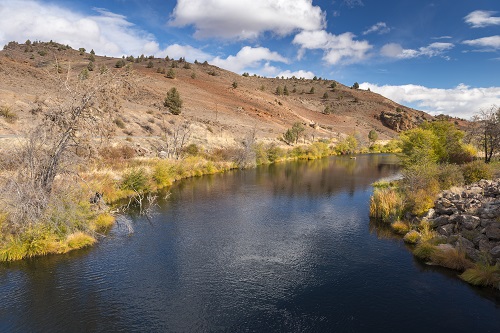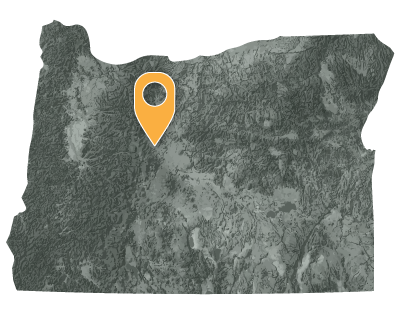 The Warm Springs River near Kah-Nee-Ta on the Warm Springs Reservation. (Oregon State Archives Photo)
The Warm Springs River near Kah-Nee-Ta on the Warm Springs Reservation. (Oregon State Archives Photo) Contact
Address: PO Box C, Warm Springs 97761
Phone: 541-553-3257
About
Treaty Date: June 25, 1855
Number of Members: 5,363
Land Base Acreage: 644,000 acres
Economy
The tribes established enterprises under the Corporate Charter operated independently of tribal government, but contribute to the economy of the reservation, including Warm Springs Power & Water, Warm Springs Composite Products and Indian Head Casino. Co-owner of PGE Hydro on Deschutes River.
Points of Interest
Indian Head Casino and the Museum at Warm Springs; the annual April Welcome Home Vietnam Veterans' Parade and Expo
History and Culture

The 644,000 acre Warm Springs Reservation was established by the Treaty with the Tribes of Middle Oregon on June 25, 1855. In the Treaty, the Tribes ceded to the U.S. ten million acres of their ancestral homeland in Oregon while reserving rights to fish at their usual and accustomed places and hunt, gather berries, dig roots and pasture livestock on unclaimed lands. Long before Europeans set foot on the North American continent, the tribes of the Warm Springs Reservation - the Wasco, The Walla Walla (later called the Warm Springs), and the Paiute - had developed societies beside the Columbia River, Cascade Mountains and other parts of Oregon. Prior to settling on the reservation, natural food resources were so plentiful that agriculture was unnecessary. Salmon from the nearby Columbia was a staple for the Wasco and Warm Springs bands. The high-plains Paiutes depended more on deer and other large game. All three tribes took advantage of assorted roots, fruits and other plant life. Salmon were harvested out of the Columbia River and its tributaries with long-handled dip nets. Roots were dug from the ground with specialized digging sticks called kapns. Berries were gathered in ornately-woven baskets.
Tribal Council
Chairman Jonathan W. Smith, Sr.; Warm Springs Chief Delvis Heath; Wasco Chief Alfred Smith, Jr.; Paiute Chief Joe Moses; Representatives: Raymond "Captain" Moody, Lincoln Suppah, Carlos Calica; Alvis Smith, III; James Manion, Wilson Wewa Jr; Rosa Graybael